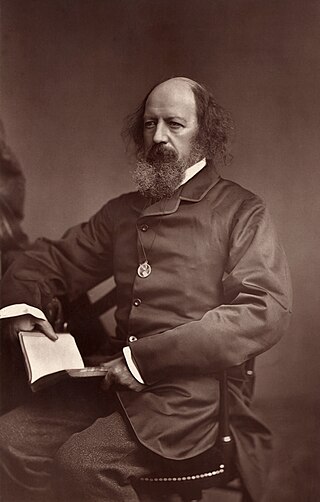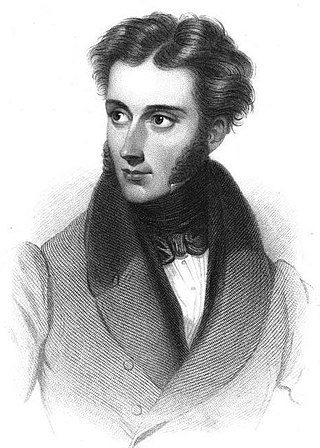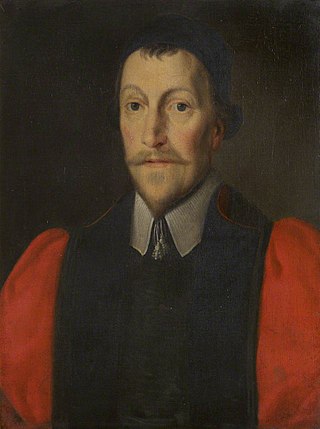Related Research Articles

Alfred Tennyson, 1st Baron Tennyson was an English poet. He was the Poet Laureate during much of Queen Victoria's reign. In 1829, Tennyson was awarded the Chancellor's Gold Medal at Cambridge for one of his first pieces, "Timbuktu". He published his first solo collection of poems, Poems, Chiefly Lyrical, in 1830. "Claribel" and "Mariana", which remain some of Tennyson's most celebrated poems, were included in this volume. Although described by some critics as overly sentimental, his verse soon proved popular and brought Tennyson to the attention of well-known writers of the day, including Samuel Taylor Coleridge. Tennyson's early poetry, with its medievalism and powerful visual imagery, was a major influence on the Pre-Raphaelite Brotherhood.
This article contains information about the literary events and publications of 1846.

Winthrop Mackworth Praed —typically written as W. Mackworth Praed—was an English politician and poet.

Dean Frederic William Farrar was a senior-ranking cleric of the Church of England (Anglican), schoolteacher and author. He was a pallbearer at the funeral of Charles Darwin in 1882. He was a member of the Cambridge Apostles secret society. He was the Archdeacon of Westminster from 1883 to 1894, and Dean of Canterbury from 1895 until his death in 1903.

The Senate House is a 1720s building of the University of Cambridge in England, used formerly for meetings of its senate and now mainly for graduation ceremonies.

A May Ball is a ball at the end of the academic year that takes place at any of the colleges of the University of Cambridge. They are elaborate and lavish formal affairs, requiring black tie or sometimes white tie, with ticket prices ranging from around £100 to as much as £640 for a pair of dining tickets at Trinity. May Ball budgets can exceed £200,000; a report by the student newspaper Varsity in 2016 found that the budget for the 2015 Trinity ball was £286,000. The balls are held in the colleges, starting around from 6-9 p.m. and lasting until well after dawn. "Survivors photographs" are taken of those who last until morning. Other colleges frequently hold winter balls, such as the popular Selwyn Snowball, who recently had acts such Tinchy Stryder and Mumford and Sons headlining.

The Ascension Parish Burial Ground, formerly known as the burial ground for the parish of St Giles and St Peter's, is a cemetery off Huntingdon Road in Cambridge, England. Many notable University of Cambridge academics are buried there, including three Nobel Prize winners.
Alice Goodman, Lady Hill is an American poet and librettist. She is also an Anglican priest, working in England.

Arthur Bernard Cook was a British archeologist and classical scholar, best known for his three-part work, Zeus: A Study in Ancient Religion.
Gerald Dawe is an Irish poet.

Edward Henry Bickersteth was a bishop in the Church of England and he held the office of Bishop of Exeter between 1885 and 1900.
Robert William Victor Gittings CBE, was an English writer, biographer, BBC Radio producer, playwright and poet. In 1978, he was awarded the James Tait Black Memorial Prize for The Older Hardy.

William Beale was an English royalist churchman, Master in turn of Jesus College, Cambridge and St John's College, Cambridge. He was subjected to intense attacks by John Pym from 1640, for an unpublished sermon he had given in 1635 supporting royal prerogative. According to Glenn Burgess, Pym's attention to Beale was because he exhibited a rare combination of Arminian or Laudian theological views with explicit political views tending to absolutism.
The Browne Medals are gold medals which since 1774 have been awarded for annual competitions in Latin and Greek poetry at the University of Cambridge.
The Porson Prize is an award for Greek verse composition at the University of Cambridge. It was founded in honor of classical scholar Richard Porson and was first awarded in 1817. Winners are known as "Porson prizemen".
The Faculty of Economics is one of the constituent departments of the University of Cambridge. It is composed of five research groups, in macroeconomics, microeconomic theory, economic history, econometrics, and empirical microeconomics. It is located in the Sidgwick Site in Cambridge, has been host to many distinguished economists, and is regarded as the birthplace of macroeconomics. 19 students or members of the faculty have won the Nobel Memorial Prize in Economic Sciences.
References
- A Complete Collection of the English Poems which Have Obtained the Chancellor's Gold Medal in the University of Cambridge (PDF). Cambridge: University of Cambridge (printed by W. Metcalfe). 1859. Retrieved 1 October 2008.
- Cambridge University Janus Records
- A list of its recipients since 1922 may be found in Graham Chainey, A Literary History of Cambridge (1986), pp. 295ff.
